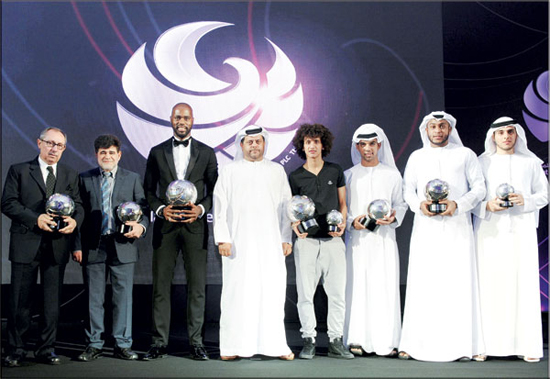
Abu Dhabi, Sep 14: UAE football enters a new era with a rebranded League — the Arabian Gulf League (AGL), which kick-off on Saturday.
And if early pointers are anything to go by, this may yet be the most open football season in the UAE top flight. There are the usual suspects to the throne, but expect a few surprises along the way.
Dubai’s Al Ahli, Abu Dhabi’s Al Jazira, Bani Yas may be looking to knock Al Ain off their pedestal. But there are a host of other clubs on either side of the E10 who could make it one of the most intriguing campaigns in recent memory.
True, Al Ahli took the bragging rights after pulling one over fierce rivals Al Ain in the season-opening Arabian Gulf Super Cup. But they were brought down to earth in the UAE League Cup, where they lost to Al Dhafrah and drew with Emirates, prompting new coach Cosmin Olaroiu to look for answers.
And Al Ain had one of their worst starts to a season after suffering a second loss on the trot in the first round of the UAE League Cup. But the Garden City club bounced back from the loss to Bani Yas to thump Al Wahda.
Al Jazira began well with a win over Al Shaab but looked second, at best, against an Al Sharjah side coached by the very man, whom Al Jazira had sacked earlier in the summer.
But none of the clubs have hit the ground running, just yet. The weather and the absence of players on international duty, meant it was not a true picture of what we saw.
A couple of rounds into the AGL, and we could probably pick a pretender to the throne.
Most of the top clubs did wise business during the close season, bringing in some new faces — foreign as well as Emirati.
It is a tough one to predict but Al Ain could yet make it three on the trot. Al Ain may have lost their master tactician Cosmin Olaroiu to rivals Al Ahli. But the Garden City club still have enough firepower to gun down a record 12th title.
Al Ain did smart business during the off season, loaning out Jires Kembo-Ekoko and bringing in Michel Bastos from French club Lyon. Another astute capture was that of Ibrahim Diaky from Al Jazira.
In Bastos, Asamoah Gyan, Diaky, Alex Brosque, Matei Mirel Radoi and the ‘Arabian Messi’ Omar Abdulrahman, Al Ain have some really good aces up their sleeve. And then there is the small matter of their exciting local talent which has served them well over the years.
Jorge Fossati may be still taking baby steps in UAE football, but the Uruguayan does have experience in the Middle East.
Al Ahli are another club who look good to adding to their five titles. The Dubai club pulled off a coup during the summer, snatching the prized Olariou from Al Ain. With captain Grafite, Luis Antonio Jimenez, Ahmed Khalil, Ismail Al Hammadi, Walid Abbas, new signing Hugo Viana and the addition of Ciel from Al Shabab, in their ranks, Al Ahli are a danger side. Expect them to go one better after finishing second last season.
Bani Yas earned promotion five years ago and they have been mixing it with the big boys, ever since. Coach-wise, they have had changes over the years another Uruguayan Jorge da Silva at the helm this season.
But their foundation of talented Emirati players remains intact. Amer Abdulrahman is an exceptional talent along with dead-ball specialist Nawaf Mubarak.
Bani Yas have retained Swede Christian Wilhelmsson but have brought in Chilean Carlos Munoz, Luis Farina and Omani defender Abdulsalam Al Mukhaini. They may have finished fourth last season but look strong to get into the winners’ circle, for the first time.
Al Jazira are a bit of a mystery, so to speak. After hitting the heights to win their first League title in the 2010-11 season under Abel Braga, the ‘Pride of Abu Dhabi’ have flattered to deceive. They have some exceptional Emirati players and also a supply line coming through from the Academy, as well as some good foreign players. But they haven’t been able to transform that into a second title.
Frequent change of coaches may be a factor as it leaves them confused as to which philosophy — South American, European or Spanish — to adapt to. After Abel Braga left to his native Brazil, three coaches have come and gone. They began with Franky Vercauteren in the summer of 2011 before ending that season with Caio Junior. Junior was on an interim basis and gave way to Paulo Bonamigo, who joined from Al Shabab.
But Bonamigo didn’t last the season as Spaniard Luis Milla has been given a longer run and it remains to be seen if he can make them play the ‘tiki-taka’ way.
Al Jazira retained Ricardo Oliveira and Shin Hyung-Min and went fishing into the Spanish La Liga to bring in Paraguayan international Nelson Valdez and Moroccan international Abdelaziz Barrada.
They have some good Emirati players in Ali Ahmed Mabkhout and goalkeeper Ali Khaseif.
Al Jazira have the looks of a champion side but they need to walk the talk.
Al Wahda, Al Nasr, Al Shabab, Al Wasl could be in the mix but the dark horse would be Al Sharjah.
After spending last season in the First Division, Al Sharjah have vowed never to go back there again. ‘The Kings’ welcomed Paulo Bonamigo with open arms after Al Jazira showed him the door. And the Brazilian has put together a crack outfit who can now beat anyone on their day.
New signings Ze Carlos, Fellype Gabriel and Mauricio Donizeti Ramos cause problems upfront against Al Jazira while Kim Jung Woo was solid at the back.
Ahmed Khamis was brilliant too and Al Sharjah could go far, maybe even the top, this time.
For now though, let’s play ball.




Comments
Add new comment